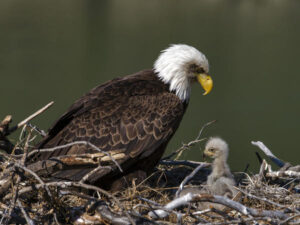
By JOHN KANELIS / johnkanelis_92@hotmail.com
We have been languishing in a flood of negative news of late: the pandemic, Donald Trump’s shenanigans, economic collapse … blah, blah, blah.
I want to share a bit of seriously good cheer: the return of the bald eagle.
This is worth cheering. The nation’s proud symbol once was on the brink of extinction. Then the federal government banned the use of DDT, a powerful pesticide that had poisoned water that provided fish for the eagles to consume. The birds would feed on the poisoned fish and die from DDT-related complications.
As National Public Radio reported: Contamination from DDT, a powerful insecticide that found its way into eagles’ prey, made their eggs so fragile that they often broke while their parents incubated them.
Then came the Endangered Species Act in 1972. DDT was banned. The eagles began their comeback. The eagle population has quadrupled since 2009, according to the Interior Department.
This is a bit of a mixed blessing in one aspect. The overall bird population continues to decline. So, I am not going to offer a full-throated cheer for the eagle’s return. I remain concerned about the decline in wildlife numbers.
Interior Secretary Deb Haaland calls the eagle’s comeback a “historic conservation success story.” Haaland, the first Native American appointed to a Cabinet post, said the eagle “has always been considered a sacred species to American Indian people, and similarly it’s sacred to our nation as America’s national symbol.”
Once Imperiled, America’s Bald Eagle Populations Are Soaring | 88.9 KETR
To think, also, that at the founding of this great nation, that one of our founding fathers, Benjamin Franklin, disliked naming the eagle as our national symbol; he preferred to give that designation to the turkey. What in the world was Ol’ Ben thinking?
Indeed, the phrase “soar like a turkey” just doesn’t have the same ring as “soar like an eagle.”
The nation’s grand bird has come back. For that I want to salute not only the bird, but those in government who in 1972 had the good sense to take action to stop its senseless slaughter.